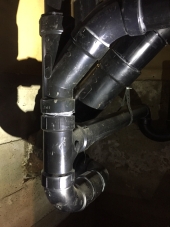

 5
5





 13
13




For all your Montana Masonry Heater parts (also known as) Rocket Mass heater parts.
Visit me at
dragontechrmh.com Once you go brick you will never go back!
 10
10




"The future is something which everyone reaches at the rate of sixty minutes an hour, whatever he does, whoever he is." C.S. Lewis
"When the whole world is running towards a cliff, he who is running in the opposite direction appears to have lost his mind." C.S. Lewis
 7
7




"The only thing...more expensive than education is ignorance."~Ben Franklin
"We can easily forgive a child who is afraid of the dark; the real tragedy of life is when men are afraid of the light." ~ Plato
 7
7




Gardens in my mind never need water
Castles in the air never have a wet basement
Well made buildings are fractal -- equally intelligent design at every level of detail.
Bright sparks remind others that they too can dance
What I am looking for is looking for me too!













 5
5




Matt McSpadden wrote:
Historically people would make good use of aprons, frocks, and a specific set of clothes that they used for the particularly dirty shores like cooking, barn cleaning, etc. The specific set of overclothes or coverings could be dirty and stay dirty and not be washed often, while the normal clothes would stay cleaner and not need to be washed as often.

 5
5




Shawn Foster wrote:
Those of you that have used the bucket-ish method, what do you do as a replacement for spin cycle/wringer? Clothes take so much longer to dry without that.
It is a privilege to live, work and play in the traditional territory of the Salish People.
Now drop and give me 52... ~ Come Join the permies Shoecamp! ~ All about Permies, including Tutorials ---
Twenty bucks off the homesteading bundle for the next 72 hours!
 7
7




 7
7







Invasive plants are Earth's way of insisting we notice her medicines. Stephen Herrod Buhner
Everyone learns what works by learning what doesn't work. Stephen Herrod Buhner
 8
8




"The only thing...more expensive than education is ignorance."~Ben Franklin
"We can easily forgive a child who is afraid of the dark; the real tragedy of life is when men are afraid of the light." ~ Plato
 8
8





Whathever you are, be a good one.
___________________________________
 5
5




"How fleeting are all human passions compared with the massive continuity of ducks.“ — Dorothy L. Sayers












 4
4
















 3
3




 1
1




thomas rubino wrote:Hey Shawn;
A five-gallon bucket with a removable lid.
One new toilet plunger.
Drill a hole thru the lid for the plunger handle.
Water (hot) and soap of choice.
 4
4




--
John Schinnerer, MA Whole Systems Design
Eco-Living Whole Systems Design services
 2
2




 2
2




"You must be the change you want to see in the world." "First they ignore you, then they laugh at you, then they fight you, then you win." --Mahatma Gandhi
"Preach the Gospel always, and if necessary, use words." --Francis of Assisi.
"Family farms work when the whole family works the farm." -- Adam Klaus

|
If you open the box, you will find Heisenberg strangling Shrodenger's cat. And waving this tiny ad:
12 DVDs bundle
https://permies.com/wiki/269050/DVDs-bundle
|




